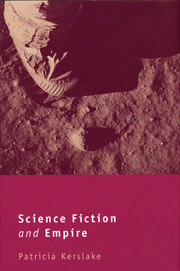Book contents
- Frontmatter
- Contents
- Introduction
- 1 The Self and Representations of the Other in Science Fiction
- 2 Resistance Is Futile: Silencing and Cultural Appropriation
- 3 The Word for World Is Forest: Metaphor and Empire in Science Fiction
- 4 Things Fall Apart: Relativity, Distance and the Periphery
- 5 Moments of Empire: Perceptions of Lasswitz and Wells
- 6 Exoticising the Future: American Greats
- 7 The Shape of Things to Come: Homo futuris and the Imperial Project
- 8 A Postcolonial Imagination: Kim Stanley Robinson's Mars
- 9 Beyond Empire: Meta-empire and Postcoloniality
- Conclusion
- Notes
- Bibliography
- Index
7 - The Shape of Things to Come: Homo futuris and the Imperial Project
- Frontmatter
- Contents
- Introduction
- 1 The Self and Representations of the Other in Science Fiction
- 2 Resistance Is Futile: Silencing and Cultural Appropriation
- 3 The Word for World Is Forest: Metaphor and Empire in Science Fiction
- 4 Things Fall Apart: Relativity, Distance and the Periphery
- 5 Moments of Empire: Perceptions of Lasswitz and Wells
- 6 Exoticising the Future: American Greats
- 7 The Shape of Things to Come: Homo futuris and the Imperial Project
- 8 A Postcolonial Imagination: Kim Stanley Robinson's Mars
- 9 Beyond Empire: Meta-empire and Postcoloniality
- Conclusion
- Notes
- Bibliography
- Index
Summary
Where is empire in SF going? Is it, as Neil Easterbrook suggests, likely to continue its ‘dedication to the serious exploration of political models’ or is it content to iterate the imperial cycle? Is SF taking inspiration from real scientific development or will it evolve more into the realm of fantasy and fable, further softening hard realities into mythical heroisms and broadening the territory of the genre? Will it continue to reflect and articulate contemporary social concerns in an estranged landscape or is SF to become a popularist parody of itself, as has its cinematic sibling? Since the term ‘science fiction’ came into general use in the 1930s, the tropes of the alien Other, of exploration, contact and settlement, of conflict and of human supremacy over marginalised indigenous species have fuelled the genre, but is the fire burning low? Will the transmutation of cyclical history into fictional scenarios maintain its fascination, or is SF already becoming blasé and predictable?
In fact, recent SF texts suggest that the genre is indeed able to maintain its fascination. Examples would include Alastair Reynolds' Redemption Ark (2002), Richard Morgan's Altered Carbon (2002), M. John Harrison's Light (2002), Ken MacLeod's Engine City (2002), Elizabeth Moon's Speed of Dark (2002), Allen Steele's Coyote: A Novel of Interstellar Exploration (2002), David Weber's War of Honor (2003) and Charles Ingrid's The Marked Man Omnibus (2002). These novels share themes of humankind's continued expansion, in both an external form (conquering new planets or rebelling against an existing hegemony) and an internal one (examining those things which make us human).
- Type
- Chapter
- Information
- Science Fiction and Empire , pp. 127 - 145Publisher: Liverpool University PressPrint publication year: 2010



